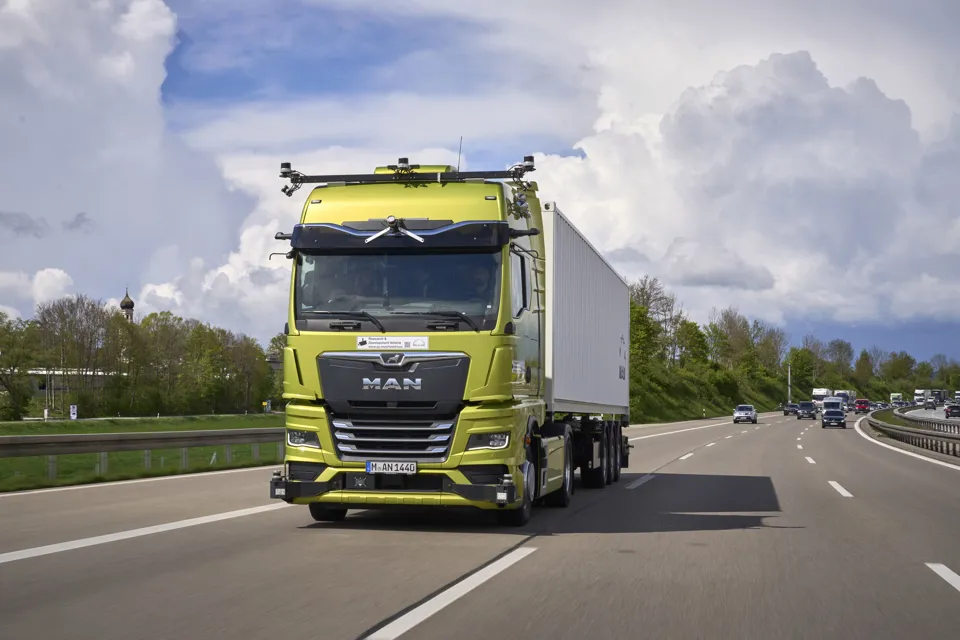MAN will be launching its new range of electric trucks in the UK in 2025 with the first ones likely to be in service with customers mid-year.
The eTGX and eTGS will boast up to 480kWh of usable battery capacity capable of delivering a daily range of up to 500 miles says the manufacturer, if an interim rapid charge-up is factored into the equation.
Rigid 4x2s and 6x2s and 4x2 tractor units will figure in the line-up but a 6x2 tractor unit will not be available, alas. There is insufficient space on the chassis to package the batteries that would be required.
At the same time MAN will be upgrading the support it offers British operators says UK managing director, Stefan Thyssen.
“The UK is the company’s third biggest market in the entire world and 2023 was our most successful year ever here in revenue and profit terms,” he added.
He wants to build on that success, and that means growing the dealer network. That will involve expanding and refurbishing some of the existing sites and recruiting more outlets.
“We’ve got 66 locations and that’s not enough,” continued Thyssen. “We need 10 to 15 more.
“By the end of 2025 every single location will be ready to deal with electric vehicles.”
The manufacturer also has plans in place to allow operators to charge their trucks at its dealerships.
A battery repair centre will open on this side of the Channel in 2025, and MAN will be offering more comprehensive funding packages.
“Traton Financial Services will soon be embedded in MAN’s UK business,” said MAN Truck and Bus global chief executive officer, Alexander Vlaskamp
Traton Group encompasses MAN, Scania, Navistar of the USA and VW Truck & Bus, which has a strong presence in South America.
At least some of MAN’s electric trucks could also be autonomous. “We’ve now got a licence to test autonomous trucks in Germany and testing has just started,” continued Vlaskamp.
It has become the first manufacturer to put an autonomous truck onto the country’s motorway network.
Vlaskamp believes that driverless models could potentially go into service with hauliers on the public highway by the end of the decade, but only if the technology used is utterly reliable and safe; and that means safer than even the best driver.
If that can be achieved then the benefits will be enormous, he says, because a driverless truck can keep working 24/7.
He envisages them being used to haul goods from one distribution hub to another, with both hubs likely to be adjacent to a motorway.
Their introduction will of course be subject to legislation, and to clarity from insurers over who is responsible if there is an accident; the truck’s manufacturer, or its owner.
While MAN is putting the bulk of its research and development efforts behind electric models, it is not neglecting other forms of low/zero-emission technology. That includes hydrogen and hydrogen fuel cells.
It plans to produce an initial 200 or so trucks under the hTGX banner that will run on hydrogen as a combustion fuel.
Due to be delivered to customers in Germany, the Netherlands, Norway, Iceland and selected non-European countries next year, the newcomer is aimed at customers who need to shift heavy loads in markets without a comprehensive battery charging infrastructure and where sufficient hydrogen is available.
MAN would like to see greater support from the UK government so far as the creation of a charging infrastructure for heavy trucks is concerned.
“Remember that road transport employs 1.5m people in Britain,” said Thyssen. “And 81% of goods are moved by road.”
The Government has introduced a 2.0-tonne gross weight concession for some alternative fuel trucks. However ,it has not increased permitted axle weights, which restricts the benefits the concession can deliver; an approach which MAN would like to see changed.
















Login to comment
Comments
No comments have been made yet.